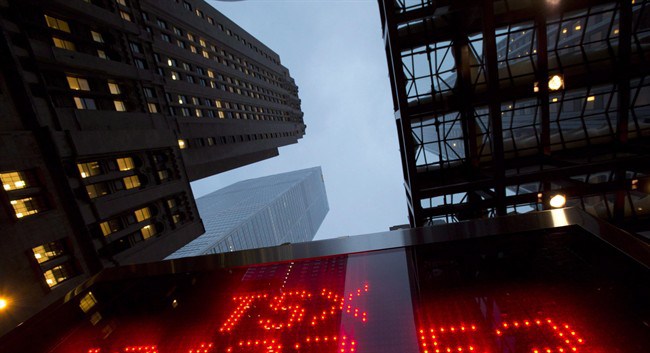TORONTO – The Toronto Stock Exchange ended Monday’s session a few points lower as a surge in oil prices failed to spark a rally and investors instead continued to fret over a slowdown in China and rising interest rates in the United States.

The S&P/TSX composite index ended the day down 6 points at 13,859.12, although the closing numbers were well off the worst levels of the day.
New York markets also traded lower following remarks on the weekend from a top U.S. Federal Reserve Board official that a September rate hike was far from off the table despite concerns over the economic slowdown in China and recent volatility on world markets.

Get weekly money news
The Dow Jones industrial average plunged 115 points to 16,528, while the broader S&P 500 index gave back 16.7 points to 1,972.17. The Nasdaq fell 51.8 points to 4,776.21.
On commodity markets, benchmark U.S. oil advanced strongly for a third consecutive trading day, with the October contract rising $3.55 to US$48.77 a barrel, while the October natural gas contract was down four cents at US$2.67 per thousand cubic feet and the December gold contract fell $1 to US$1,133.00 an ounce.
MORE: Don’t get hopes up over oil’s recent rally, Scotiabank says
The advance in oil prices came after the U.S. Energy Department cut its estimate for U.S. oil production, citing cutbacks in Texas. That helped make the energy sector the only positive performer on the TSX, up 2.26 per cent. It also benefited the oil-sensitive Canadian dollar, which was up 0.20 of a U.S. cent at 75.87 cents US.
Traders were cautions after Fed vice-chairman Stanley Fischer said told the central bank’s annual gathering in Jackson Hole, Wyo., on the weekend that despite recent turmoil, policy-makers still had a “pretty strong case” for raising rates in September.
Fischer emphasized he was not saying what action the Fed might take at its policy rate meeting in September, but analysts interpreted his remarks as meaning the U.S. economy is getting close to satisfying the Fed’s conditions for a hike.
Rates have been at historically low levels near zero since the 2008 financial crisis, something that has been credited with helping fuel advances on stock markets since then.





Comments